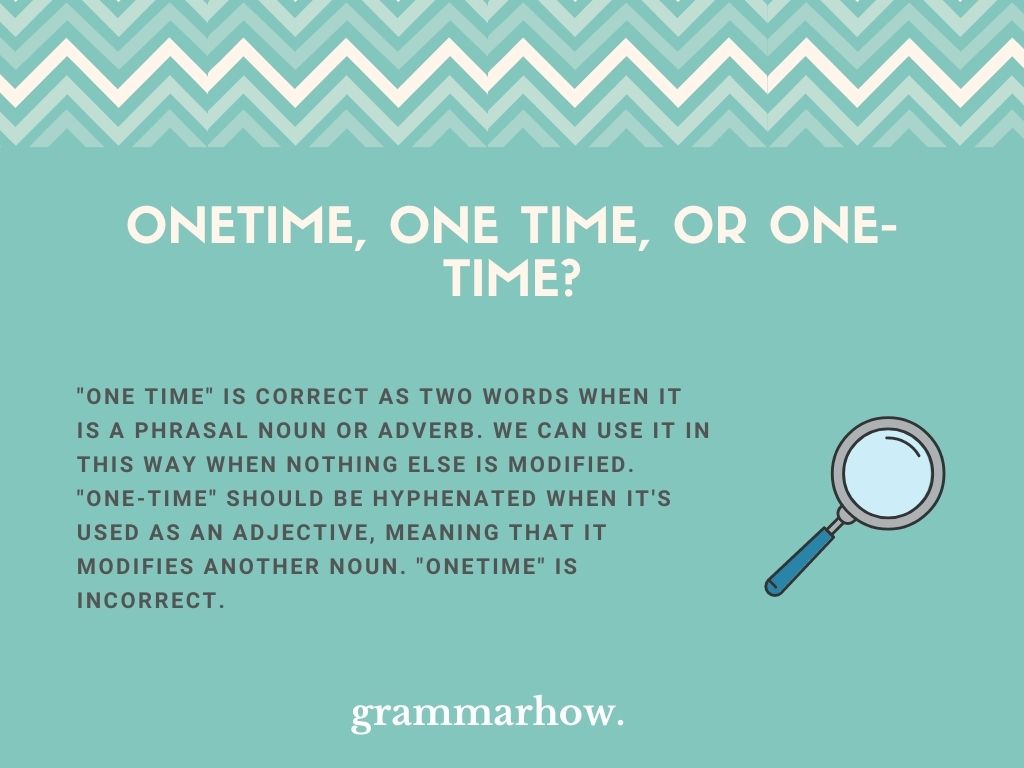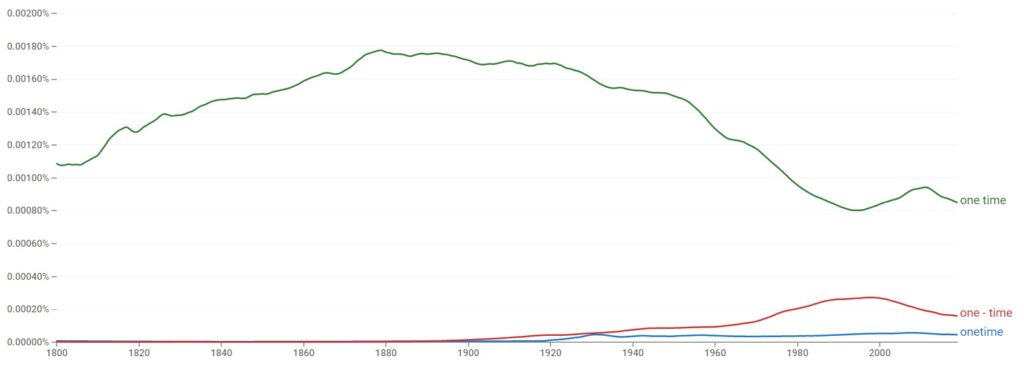We can write “one time” in a few different ways. In some cases, it’s one or two words, and we might need it hyphenated if certain rules are followed. This article will explore all the rules you need to understand!
One time vs. One-time vs. Onetime
“One time” is correct as two words when it is a phrasal noun or adverb. We can use it in this way when nothing else is modified. “One-time” should be hyphenated when it’s used as an adjective, meaning that it modifies another noun. “Onetime” is incorrect.

According to Google Ngram Viewer, “one time” is the most popular choice of the three. This is due to it being a noun form, and it’s much more common to use it in any given context. “One-time” still has some usage, though, showing it’s still correct.

The Cambridge Dictionary and The Oxford Dictionary define “one-time” as an adjective. They both make a note of “one-time” with the hyphen and provide examples of how it works.
Both dictionaries also mention that “one time” is a variant spelling but works as a phrasal noun too.
These examples should help you to work out the difference between the noun and adjective forms:
- Adjective: It’s a one-time purchase, and you get to keep it for life!
- Noun: There was this one time when I didn’t know what I was supposed to do!
Is “Onetime” One Word?
“Onetime” is not correct when grouped into one word. The graph above showed that it’s rarely used, and it’s much better to write it as a hyphenated variation because this keeps it more true to typical English language rules. “One-time” should always be the correct form.
Perhaps you’d benefit from reading through these examples:
- Correct: There was that one time when he wanted to go out but didn’t have the money.
- Incorrect: Wasn’t there onetime when you thought you had everything?
- Correct: It’s a one-time mistake, and I’ll be certain never to make it again, okay?
- Incorrect: It’s not a onetime stop. If you’re going to commit to it, you have to decide right now.
Is “One time” Two Words?
“One time” should be written as two words when it’s a noun form. We can also use it as a basic phrase to simply show that it is referring to one particular time. It’s common for people to write this when they’re talking about specific times in their lives.
Here are a few examples to show you how the phrase or the noun forms work:
- There was this one time when I thought I loved him, but that was a long time ago now!
- You haven’t it all wrong! One time was never going to be enough to get good at this.
- It’s not just the one time! There have been plenty of other mistakes that he’s made!
- One time or two times is irrelevant. You can’t let a simple mistake like this happen again!
Is “One-time” Hyphenated?
“One-time” is an adjective. We hyphenate it when it’s used to modify a noun in a sentence. This is a common English rule that must be followed, and it typically applies when the noun comes directly after “one-time” (as this is the most common formation).
We can use AP Stylebook guidelines to teach us more about the hyphen. With AP style, hyphens connect adjectives. If more than one word modifies the same noun, those words should be connected and turned into a compound adjective.
Check these out if you’re stumped:
- It’s a one-time deal, and you won’t find anything like this again!
- I’m going to give you a one-time pass on this. Make sure you don’t let it happen again.
- It’s a one-time error in judgment, and he was really sorry about it.
- I haven’t got time for one-time dates! We need to be ready to commit to this!
Is “Time” Capitalized In The Word “One-Time”?
There is no reason to capitalize either part of “one-time.” It is not a proper noun, so capitalization does not affect it.
If you write it in a title, you might find it useful to capitalize both parts. This only applies if every word in your title is already capitalized, and you can treat the two forms separately within the hyphen to keep it in line.

Martin holds a Master’s degree in Finance and International Business. He has six years of experience in professional communication with clients, executives, and colleagues. Furthermore, he has teaching experience from Aarhus University. Martin has been featured as an expert in communication and teaching on Forbes and Shopify. Read more about Martin here.

